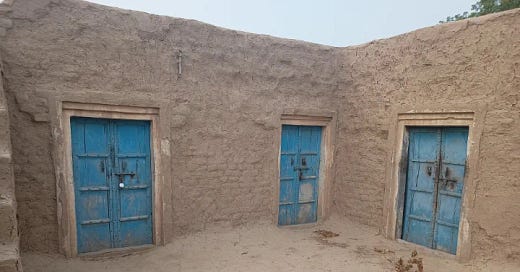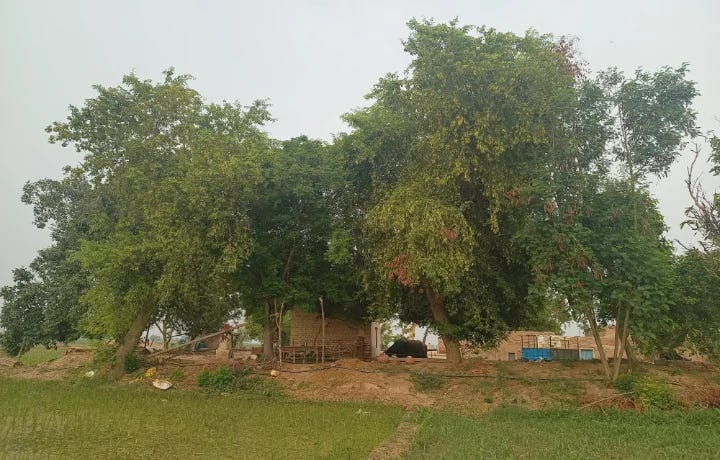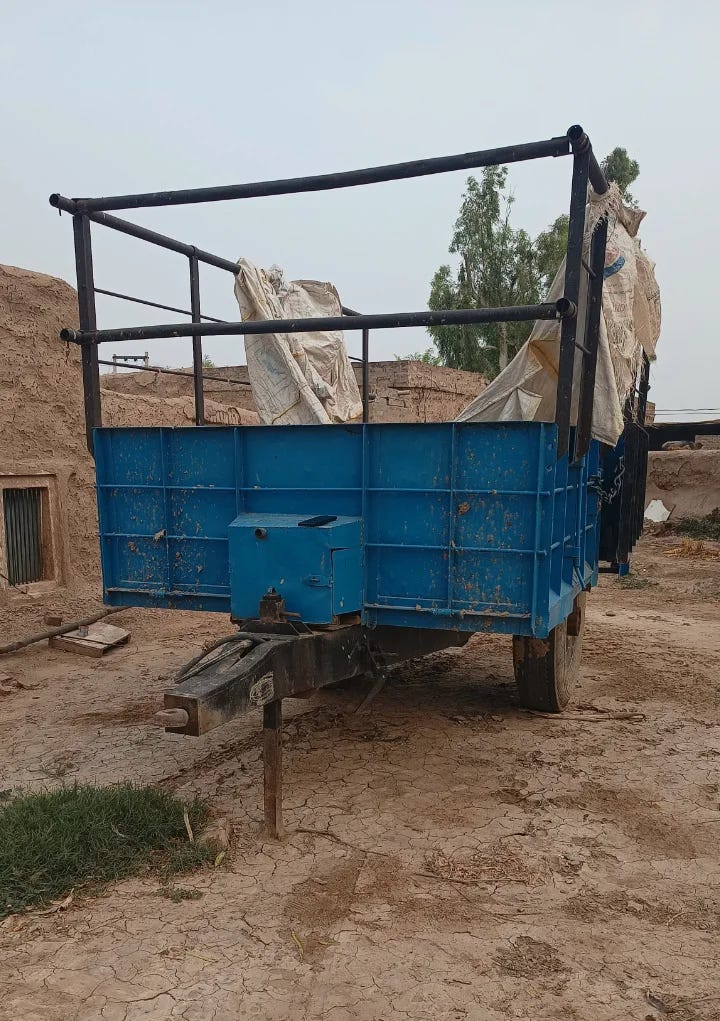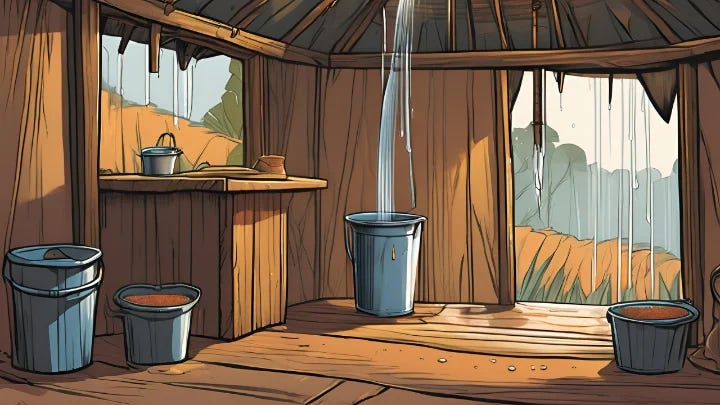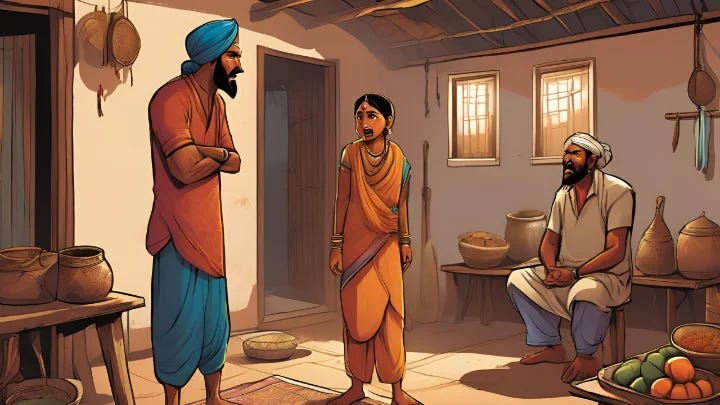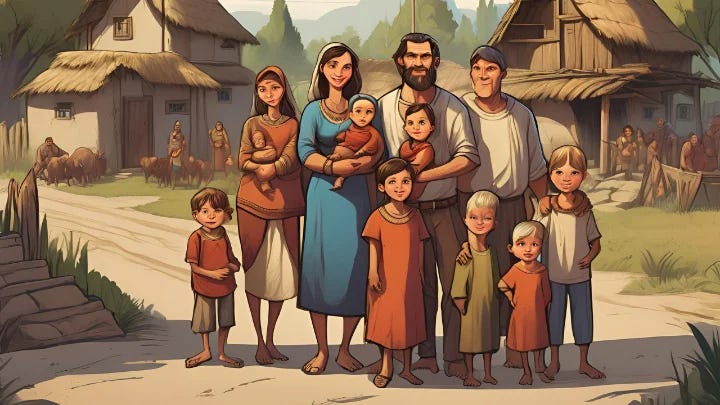Total words: 1600 | Reading time: Approx. 6m 30s
When is a house called a home?
There could be many and very deep meanings to this.
I don't know if you have the answer to it or not, but this article, written from an emotional perspective, will teach you the true meaning of home and how peace can be achieved by staying in a dignified home.
On a farm, a kacha ghar (a house made of cow dung and mud), where no bricks were needed, cherished a beautiful garden with plants of different types of fruits and vegetables.
An older woman used to water those plants several times a day from a pot. Children used to play, elders used to be busy with their own work, and no one had anything to do with useless conversation.
In the evening, everyone used to sit together and laugh, sharing each other's joys and sorrows. Children used to try to turn on the old TV in a room empty oftentimes. Everyone used to follow the orders of the elderly lady in that house very politely.
Buffalo milk and pure cow ghee were available in abundance.
The town market was far away from the farm; there was no special means of transportation, but an old bicycle could easily cover this long distance.
However, when more than two people had to go to the market, they would attach a trolley to the tractor used in farming, and then the elders of the house and all the women would sit in it and go to the market.
There was no shortage of water. There was a canal nearby, and the farm also had a borewell. But the women of the house kept on bringing pots of water to the house throughout the day.
Dry wood from trees and fuel obtained from cotton cultivation were used for cooking.
Food cooked on the clay stove tasted very delicious.
At night, the eldest of the family listened to the BBC Hindi reporters, who told the news in very simple language.
The songs of Mohammad Rafi and Lata Mangeshkar used to make the night fun. On a moonlit night, everyone used to enjoy those songs while lying down, with more than ten cots placed together.
It was a mud house indeed, but it never felt like that.
It felt like a concrete house–because of the emotions, happiness, the way each person spoke, and their helping attitude.
It was a mud house, but there was no lack of happiness there.
If the roof of any room in the house leaks during the rains, everyone would place utensils in the leaking place and later use the same rainwater for drinking or cooking. No one had the idea that sand and cow dung could purify the water on their own.
Everyone was so connected to each other that there was no scope for lying or complaining.
Do cement and bricks really make a solid house?
It depends on your thinking as to why people living in a tent call it a house and why you cannot call a luxurious house a home even if you live in it.
It also depends on your nature when you understand the real meaning of a home.
You May Also Like
There was a pakka ghar (concrete house) nearby.
They also had a farm—rice, cotton, mustard, wheat, etc., were grown in good quantity. All the comforts like motorcycles, cars, tractors, TVs, etc., were available in the house, but that pakka ghar could never become strong despite being built of concrete.
Every day, there was a family quarrel. The father was beating the son; the son was abusing the father. Whenever the neighbours went to resolve any dispute in the house, they were in trouble. The atmosphere of that house kept deteriorating day by day; the children of that house developed an addiction to drugs, and that addiction also became the reason for suicide in that house.
Finally, they sold their farm and left.
That house lacked peace, unity, trust, happiness, feelings and emotions.
This was because no one in that house listened to the words of any of the elders. That house lacked an elder whose contribution would be like bitter medicine, which is bitter in taste, but its effect would heal the wounds.
That house lacked an elder, like a rough wall whose scolding also felt like something good was happening. A rough wall that had the courage to take upon itself the wounds of all the house's right and wrong decisions.
A wall that keeps all the big and small differences of the family behind and presents them all together on the stage of the world.
A that kind of rough wall that tests truth and lies through its own experience. A wall that is so old that it has no fear of collapsing, which has gained such experience from its age that no one in the house can even try to disobey it.
All these things do not mean that if there are no elders in someone's house, there will be no peace in that house.
It means who among the people of that house would want to become that rough wall, who would have to work day and night to make a house a home, who would have to think about the well-being of their family even after taking all the insinuation on themselves?
Who would forgive their people first when forgiving someone felt like a crime?
It means who will take the initiative to bring peace to the house first and who will achieve humility first.
Whether a house is made of mud or concrete is not considered a home, but whether the people of your house are obedient or not makes a house a home in the true sense. Where there are obedient people, everyone is polite by nature, and where everyone is polite, there is no discrimination among them, and neither bitterness arises among them.
Being obedient is the rule of the house and we can say that a good house is the one that runs on rules.
It is not only in the office or school or any other institution that there are rules; there are rules or punishments to maintain any system, and in the house, rules and punishments are necessary.
Rules and punishments may vary from level to level but are necessary.
When the time for the rough wall of the house to break down is near, the rough wall should try to hand over this responsibility to an experienced and calm person in the house, and until their last breath, they should work on educating the new rough wall with their experiences.
Yes, it's not possible to have all the people polite or well-mannered; as the saying goes, “not all the five fingers are equal.” But here, that wall works as a bridge between people.
It connects people who don't want to.
The rough wall of the kacha ghar in this story was an older woman whose words no one could ignore. No one doubted her words and actions. This was a wall that had seen many ups and downs in her life, and she had always protected and nurtured her family by staying ahead.
Everyone in the family felt safe and happy by staying behind this wall.
But everything comes to an end, and in the year 2011 this old lady left this world forever.
This rough wall of the house collapsed, and with it, all the trees and plants slowly dried up; the beautiful garden of the house was ruined. The water that used to come into the canal seven days a week now started coming only once a week.
The atmosphere of the house changed as soon as that old lady left.
The water of all the tube wells started becoming bitter. Farming was now limited to rice only.
The differences among the family members started coming out in the open, and slowly, all the house walls started breaking down. The family members did not even consider it appropriate to get them repaired; now, everyone starts liking a solid and strong house.
All the family members sold all their animals and started leaving the farm one by one. Today, all the family members are living in “pakka ghar” with their families in their respective separate houses with all the amenities.
Today, the farm is deserted. That kacha ghar looks like a ruin. One day, there won't be ruins to see of that; all the sweet memories seem like a dream.
Today, everyone has learned to talk about their own interests. All this happened because no one wanted to become that thing in the house that would strengthen the house; everyone wanted to build only their own house.
It could be a strong wall, or the roof of the house, or a pillar of the house, or a window of the house.
Look at your house and see what the strongest thing in it is that has to face storms, rain, hurricanes, etc. Even today, that thing is standing firm and protecting you. What effect will its absence have on you?
Where do you find yourself standing without that thing?
This story is true; it is from my maternal grandparents' home.
Thank you for reading my another Substack post. I hope you liked it and that it has offered you a valid point about improving your family life, not so in a freakish way but in a steady and humble way.
Do you have any views? Please share them in the comments. I’d love to hear what you have to say about it.
Please hit the little heart ❤️ button. It will help my post get seen by other readers.
Share it to support me and motivate me to write more small posts that matter.
Thanks again
Have a wonderful day.
See you in my next post
Till then
Be a Humble Human

